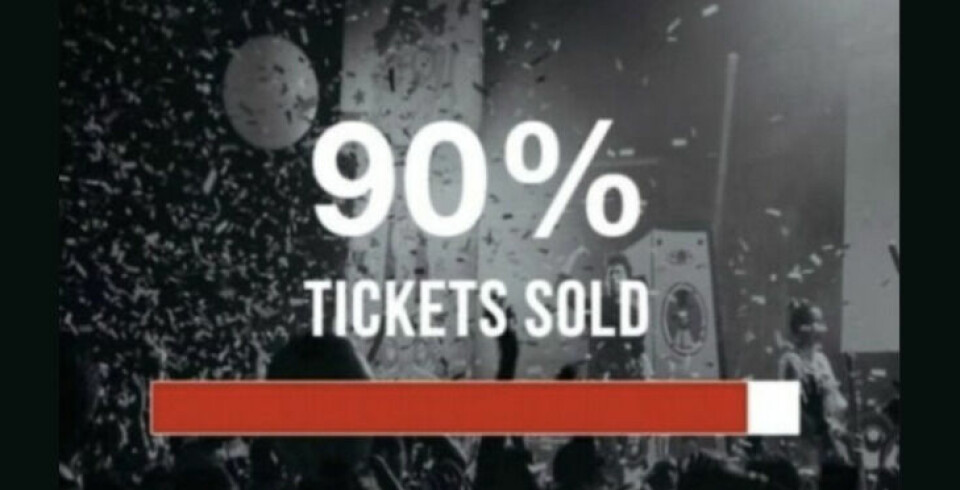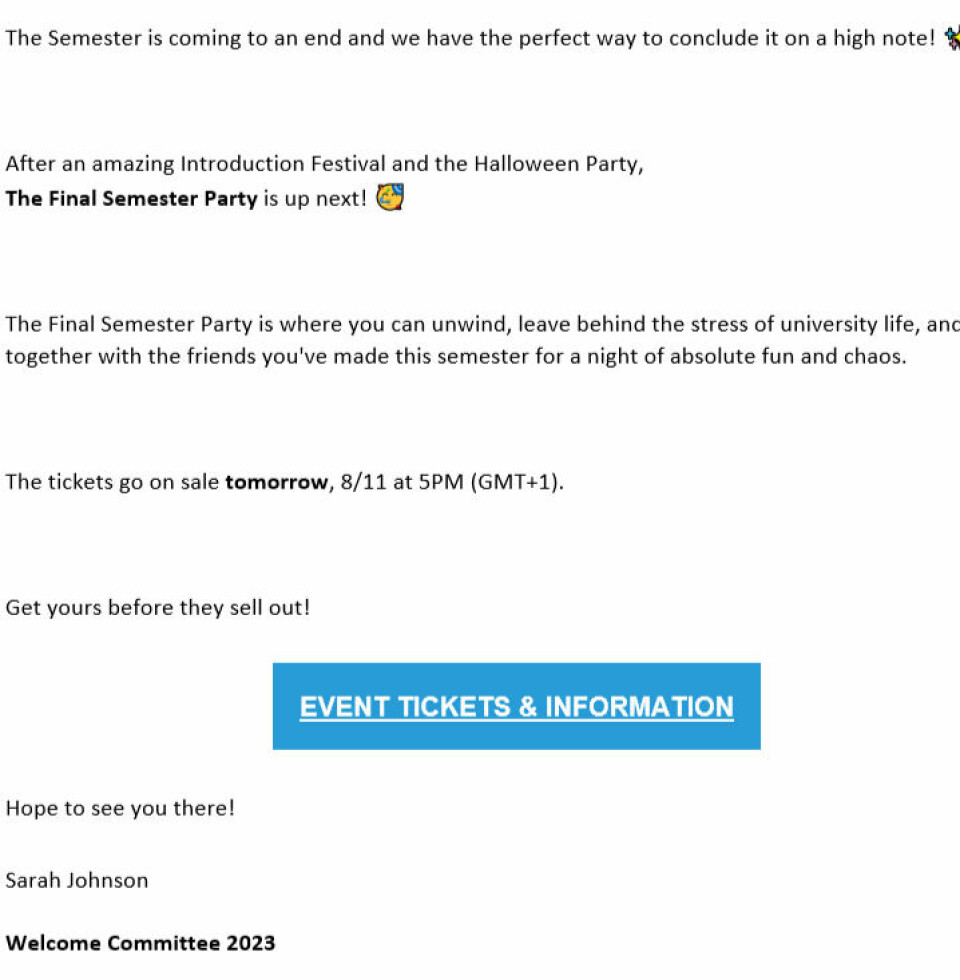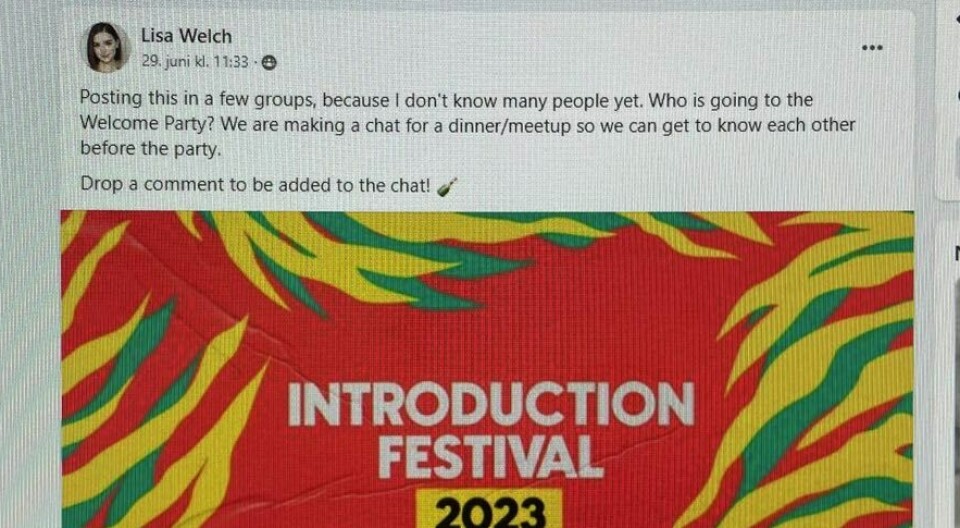
International students allegedly scammed – were sold tickets to fake parties
NTNU and Erasmus Student Network (ESN) are warning students about an organisation calling themselves International Student Network (ISN).
Kimberly Lahr is on exchange from Berlin and studies entrepreneurship. She explains that she received an email some time before she was due to depart from Germany for her exchange year in Trondheim.
– It was from a «welcome committee» at ISN, and it encouraged students to buy tickets for a welcome party at Tyven.
Lahr shares that you could buy the ticket separately or in a bundle for this party and two others, and it would be cheaper to buy it as a bundle
– They said to hurry up and buy the tickets, as they would sell out quickly. There were also supposed to be several rounds of ticket sales, and the later rounds were more expensive.

She ended up buying the ticket bundle for the «first round price» and paid around 300 NOK in total. She says she knows of two other girls from her university that also got these emails and ended up buying the tickets.
– Getting entrance to three parties for that price seemed like a pretty good deal, especially given what I had heard about the prices of such things in Norway.
She got electronic tickets by email, and everything seemed fine so far.
The «welcome party»
When Lahr arrived in Trondheim, she met representatives from Erasmus Student Network (ESN) during the introduction week. She asked them whether they were the same organisation that had contacted her about the party, and they told her that they were not, but that they had heard of ISN. They also told her that it seemed like a scam to them, but that Tyven is a real bar and she could still go there if she wanted to. She and her friends decided to turn up anyway, just to check it out.
– It was just a normal night at the bar, really, and free entrance. There was no one there checking tickets or representing ISN, and there was nothing to suggest that this was a welcome party for new international students. It was a nice enough bar, but it did not feel like what it had been sold as.
Lahr says that if she had not talked to ESN before she went to Tyven, she might not even have realised that it was a scam.
– I think I would have found it weird that they did not check the tickets, since I paid for it, but I did not know what to expect. It was also weird that there was nobody there from the organisation. But by the second party it would be pretty obvious that it was not legit.
World wide operation?
ISN has a Facebook page where they post events all over the world. Scrolling through it, there are often up to a hundred identical events, with the same name, picture and description, with just the location being different. The same events are apparently held in Tokyo, Stockholm and Sydney, to name a few. The comments are always turned off on the events. Under «Page transparency» it is possible to see that the people who manage the page are primarily from the Philippines. After the events they will often post pictures, sometimes hundreds of them, showing smiling international students.
The day after the «welcome party» that Kimberly Lahr attended in August, pictures were also posted on ISN’s Facebook page. The pictures are taken at Tyven, and Under Dusken has confirmed that international students that were there that night can be seen in the pictures. Under Dusken has not been able to get in touch with anyone in the photos, and the photos are not credited.
Presented themselves as a welcome committee

Guro Kvilten is the former president of ESN Trondheim and is currently the vice president of ESN Norway. In this article she is speaking on behalf of the Trondheim branch of ESN. She says that they have known about ISN for some time, and that they have heard many similar stories to that told by Lahr.
– Many students have received such emails to their university email account. The emails will often say things like «The cheapest tickets are already sold out, hurry up and get yours now, before we sell out the rest!».
Anja Linge Valberg is Head of Office at the Office of Admission and International Relations at NTNU. She says that they also have heard such stories from students and adds:
– We found that the emails they sent out were written to give the impression that ISN acted as a welcome committee for new international students.
Valberg says that they found this suspicious, as they had never heard of ISN, and the organisation somehow knew that these students were coming to Trondheim on exchange.
– As far as we can see, ISN is not a legitimate organisation, but a Facebook/Instagram operation (with a shell website) that emails international students to sell tickets to events that either do not require tickets for entry (an open venue) or do not exist.
Facebook groups run by scammers?

Both NTNU and ESN say that they suspect two Facebook groups for international students in Trondheim of being connected to the scam, and that this is how they are getting students’ emails. To join these groups, you are asked to enter your university email address to «confirm that you are a student».
– The groups are not affiliated with NTNU in any way, but appear legitimate at first glance. This has unfortunately tricked several students into providing their email address to join the group. Some have provided their home institution, and some their NTNU address, says Valberg.
Both ESN and NTNU say that they believe the groups are run by fake accounts.
– These groups are created by a suspicious nondescript Facebook page with similarities to that of ISN, and administered by fake Facebook profiles (pretending to be international students) who regularly promote ISN events in the group. We therefore have reason to believe that the same person or people run these groups and the ISN, says Valberg.
The four administrators are the same for both groups, and looking at their profiles they only have one picture and one background picture each. They all have English sounding names and say they are from either Canada or the US. There is very little more information about them.
Valberg says that the scammers are targeting exchange students, a group that is particularly vulnerable, especially during the transition period of moving to and settling in a new country. Kvilten from ESN agrees and adds:
– Students join these groups on Facebook and Whatsapp hoping to meet people in a new country, and there they see this party that everyone is apparently going to. In reality, it is just the scammers using fake profiles to make it look like many people are talking about it.
– Very cynical and calculated
Kvilten says that in addition to the groups they think are run by the scammers themselves, they also join other groups, posting there as well.
– They infiltrate everything, several international student groups on both Facebook and Whatsapp.
She adds that one of these parties was shared in ESN’s Facebook group a while back. They then saw it posted in other groups as well, with the same exact text, but by a different account.
– Looking closer at the profiles of those posting, they quite clearly seem fake. But the tone of the post seemed quite genuine, asking things like «Is anybody else going to this party? I am new in town and don’t know anybody yet. Would anyone want to go there with me?».
Kvilten says that the scammers know that the students are anxious to meet new people and make friends in a new country, and are taking advantage of that.
– It is very cynical and calculated.
Kvilten says that the groups have gotten really big and are now used like normal Facebook groups, but with things like housing scams being posted regularly, because it is not moderated. At the time of writing this, one of the groups has 5300 members and the other 1700.
– They have gotten so many people to join these groups now, that there are a lot of genuine posts by real people. The scam posts being mixed in with these real posts makes it all seem more legit. If you look at this group now, it is hard to see that it is fake.

The Halloween party that disappeared
The ticket bundle bought by Lahr included two more parties. The Halloween party was supposed to take place on the 25th of October, also at Tyven bar, according to the Facebook event. Shortly before that, the date was changed to the 3rd of November, and the location was changed to just «Trondheim». Then the event disappeared completely from their Facebook page.
There is still one more party, called the «Final semester party», supposed to take place on the 7th of December, also at Tyven. This event is still on ISN’s Facebook page, and we have confirmed from several students that they have received emails to buy tickets for this event as recently as the 8th of November. On the 9th of November, ISN posted on the event page:
«90% of the tickets for round 1 are sold out! Make sure you get them today to avoid paying more in the next round of tickets..»
Neither Tyven nor ISN has answered Under Dusken’s requests for comments, and we have therefore not been able to confirm whether this last party is actually happening. We have also not been able to confirm whether Tyven ever had any form of collaboration or contact with ISN.
Valberg says that NTNU has also tried to contact ISN:
– We have received no response to any of our inquiries to ISN. We have been in contact with one of the venues where ISN claimed to be hosting events in Trondheim – the venue states that they no longer do business with them due to ‘unprofessional behaviour’ by ISN.
– The name creates confusion
Kvilten from ESN says that this kind of scamming is happening all over Europe and beyond.
– When the students get here, it quickly spreads that these parties are a scam, but as a large part of the international student mass is replaced each year, they are able to come back and run the same scam again the year after.
ESN believes that the name, International Student Network, was chosen purposely to make people confuse them with Erasmus Student Network.
– The abbreviation is also very similar: ISN and ESN can even sound very similar, especially pronounced in Norwegian.
She says that students often think they are the same organisation.
– We have also heard that bars and clubs in Trondheim are confusing us with ISN. We have been hosting events at Studio 26 for years, but they had apparently been called up and warned about working with us, because some bars had been having bad experiences with ISN.
How to recognise a scam
Kimberly Lahr says that she usually does not fall for scams, but that this one was well executed. She hopes that her story will help warn others, and that she will also reach out to the new students coming from her university.
– Even if it seems legit, I would advise everyone to double check everything. If you have contact with people who are already in Trondheim, I would reach out to them and ask if they think it is real. This is very well organised. I am usually very careful, and I still fell for this.
Kvilten from ESN seconds this advice:
– On our platforms, we have encouraged students to contact us if there is anything they are unsure of, and we can take a look at it for them. We have also given a general warning about ISN and their parties, after hearing from a lot of students that this is a scam.
NTNU now has a section on their webpage for international students called «Known scam sites», where they warn people about the two Facebook groups.
– We work to inform them well ahead of their arrival about what to be cautious of and what to avoid. We also make sure to inform students about which actors NTNU cooperates with and can verify the legitimacy of.
Valberg says that a majority of scams known to them are related to housing.
– We work hard to inform students about how to safely search for housing and verify the legitimacy of housing offers.

And what to do if you already fell for it
If you end up falling for a scam, there are still things you can do to get your money back. If you paid with a credit card, you can raise a claim with the credit card company.
Kimberly Lahr paid with Pay Pal, and after our interview, she requested her money back from them. She later got refunded the total amount of her purchase. Valberg says that NTNU advises students that have been scammed on how they can pursue reimbursement and report the issue to the appropriate authorities.
– Students should always keep documentation and evidence of any agreement or sale.
Valberg says NTNU has not reported these cases to the police.
– But we have advised students who have been scammed by ISN to do just that. We do not know whether any students have done so.
READ ALSO: Be
our
guest!

































